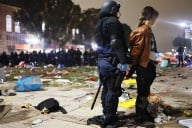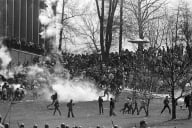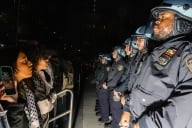You have /5 articles left.
Sign up for a free account or log in.
At the annual meeting of one of the regional accrediting agencies a few years ago, I wandered into the strangest session I’ve witnessed in any academic gathering. The first presenter, a young woman, reported on a meeting she had attended that fall in an idyllic setting. She had, she said, been privileged to spend three days “doing nothing but talking assessment” with three of the leading people in the field, all of whom she named and one of whom was on this panel with her. “It just doesn’t get any better than that!” she proclaimed. I kept waiting for her to pass on some of the wisdom and practical advice she had garnered at this meeting, but it didn’t seem to be that kind of presentation.
The title of the next panel I chose suggested that I would finally learn what accrediting agencies meant by “creating a culture of assessment.” This group of presenters, four in all, reenacted the puppet show they claimed to have used to get professors on their campus interested in assessment. The late Jim Henson, I suspect, would have advised against giving up their day jobs.
And thus it was with all the panels I tried to attend. I learned nothing about what to assess or how to assess it. Instead, I seemed to have wandered into a kind of New Age revival at which the already converted, the true believers, were testifying about how great it was to have been washed in the data and how to spread the good news among non-believers on their campus.
Since that time, I’ve examined several successful accreditation self-studies, and I’ve talked to vice presidents, deans, and faculty members, but I’m still not sure about what a “culture of assessment” is. As nearly as I can determine, once a given institution has arrived at a state of profound insecurity and perpetual self-scrutiny, it has created a “culture of assessment.” The self-criticism and mutual accusation sessions favored by Communist hardliners come to mind, as does a passage from a Credence Clearwater song: “Whenever I ask, how much should I give? The only answer is more, more!”
Most of the faculty resistance we face in trying to meet the mandates of the assessment movement, it seems to me, stems from a single issue: professors feel professionally distrusted and demeaned. The much-touted shift in focus from teaching to student learning at the heart of the assessment movement is grounded in the presupposition that professors have been serving their own ends and not meeting the needs of students. Some fall into that category, but whatever damage they do is greatly overstated, and there is indeed a legitimate place in academe for those professors who are not for the masses. A certain degree of quirkiness and glorious irrelevance were once considered par for the course, and students used to be expected to take some responsibility for their own educations.
Clearly, from what we are hearing about the new federal panel studying colleges, the U.S. Department of Education believes that higher education is too important to be left to academics. What we are really seeing is the re-emergence of the anti-intellectualism endemic to American culture and a corresponding redefinition of higher education in terms of immediately marketable preparation for specific jobs or careers. The irony is that the political party that would get big government off our backs has made an exception of academe.
This is not to suggest, of course, that everything we do in the name of assessment is bad or that we don’t have an obligation to determine that our instruction is effective and relevant. At the meeting of the National Association of Schools of Art and Design, I heard a story that illustrates how the academy got into this fix. It seems an accreditor once asked an art faculty member what his learning outcomes were for the photography course he was teaching that semester. The faculty member replied that he had no learning outcomes because he was trying to turn students into artists and not photographers. When asked then how he knew when his students had become artists, he replied, “I just know.”
Perhaps he did indeed “just know.” One of the most troubling aspects of the assessment movement, to my mind, is the tendency to dismiss the larger, slippery issues of sense and sensibility and to measure educational effectiveness only in terms of hard data, the pedestrian issues we can quantify. But, by the same token, every photographer must master the technical competencies of photography and learn certain aesthetic principles before he or she can employ the medium to create art. The photography professor in question was being disingenuous. He no doubt expected students to reach a minimal level of photographic competence and to see that competence reflected in a portfolio of photographs that rose to the level of art. His students deserved to have these expectations detailed in the form of specific learning outcomes.
Thus it is, or should be, with all our courses. Everyone who would teach has a professional obligation to step back and to ask himself or herself two questions: What, at a minimum, do I want students to learn, and how will I determine whether they have learned it? Few of us would have a problem with this level of assessment, and most of us would hardly need to be prompted or coerced to adjust our methods should we find that students aren’t learning what we expect them to learn. Where we fall out, professors and professional accreditors, is over the extent to which we should document or even formalize this process.
I personally have heard a senior official at an accrediting agency say that “if what you are doing in the name of assessment isn’t really helping you, you’re doing it wrong.” I recommend that we take her at her word. In my experience -- first as a chair and later as a dean -- it is helpful for institutions to have course outlines that list the minimum essential learning outcomes and which suggest appropriate assessment methods for each course. It is helpful for faculty members and students to have syllabi that reflect the outcomes and assessment methods detailed in the corresponding course outlines. It is also helpful to have program-level objectives and to spell out where and how such objectives are met.
All these things are helpful and reasonable, and accrediting agencies should indeed be able to review them in gauging the effectiveness of a college or university. What is not helpful is the requirement to keep documenting the so-called “feedback loop” -- the curricular reforms undertaken as a result of the assessment process. The presumption, once again, would seem to be that no one’s curriculum is sound and that assessment must be a continuous process akin to painting a suspension bridge or a battleship. By the time the painters work their way from one end to the other, it is time to go back and begin again. “Out of the cradle, endlessly assessing,” Walt Whitman might sing if he were alive today.
Is it any wonder that we have difficulty inspiring more than grudging cooperation on the part of faculty? Other professionals are largely left to police themselves. Not so academics, at least not any longer. We are being pressured to remake ourselves along business lines. Students are now our customers, and the customer is always right. Colleges used to be predicated on the assumption that professors and other professionals have a larger frame of reference and are in a better position than students to design curricula and set requirements. I think it is time to reaffirm that principle; and, aside from requiring the “helpful” documents mentioned above, it is past time to allow professors to assess themselves.
Regarding the people who have thrown in their lot with the assessment movement, to each his or her own. Others, myself included, were first drawn to the academic profession because it alone seemed to offer an opportunity to spend a lifetime studying what we loved, and sharing that love with students, no matter how irrelevant that study might be to the world’s commerce. We believed that the ultimate end of what we would do is to inculcate both a sensibility and a standard of judgment that can indeed be assessed but not guaranteed or quantified, no matter how hard we try. And we believed that the greatest reward of the academic life is watching young minds open up to that world of ideas and possibilities we call liberal education. To my mind, it just doesn’t get any better than that.








